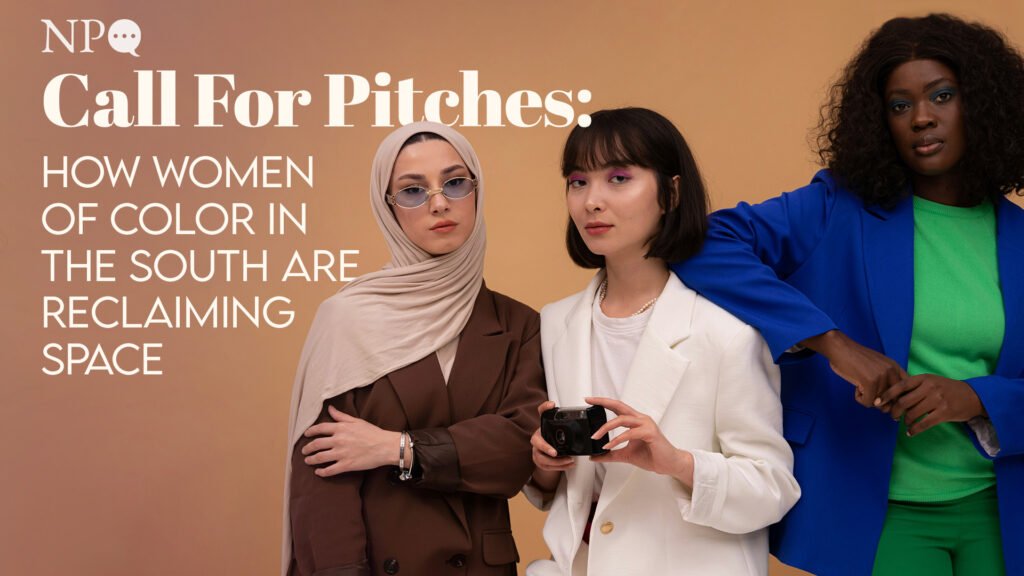
Nonprofit Quarterly Magazine’s Spring 2025 Racial Justice Issue
~Call for Racial Justice Articles, Creative Writing, and Art~
Nonprofit Quarterly invites you to contribute to a special print issue of NPQ centered on women of color in the South taking up and reclaiming space, to be published in the spring of 2025.
Media and historical narratives often uplift the notion of the South as a backward place. It is the place with the most restrictions on reproductive and voting rights in the country. It is also where recent book bans and attacks on Diversity, Equity, and Inclusion have taken hold.
But the South is also the region that the majority of Black people in the United States call home. It is where women of color, and Black women in particular, are reclaiming space they’ve historically been denied—space in boardrooms and on campuses, in voting booths and on formerly occupied land, with differently abled bodies and as reproductive bodies.
Less than 60 years after Black women in the South gained the protected right to vote, Vice President Kamala Harris became the first woman of color to accept a major party’s nomination for president. In 2024, people worldwide are asking what it could and would look like if a woman of color were to occupy one of the biggest spaces in the world, as the President of the United States.
And so, as we look forward to 2025, we are uplifting women of color in the South who have been and continue to take up space and refuse erasure, as artists and as lawyers, in executive roles and through restorative investments, from mosques to the media, in libraries and across classrooms, as young people and in honor of elders and ancestors.
In refusing to allow people and policies to define who they are, women of color in the South are changing historical narratives for future generations in the South—and also, beyond it. For as W.E.B. Du Bois said, “As the South goes, so goes the nation.” This issue of NPQ honors these Southern women of color, the space they claim, and their stories.
What we are looking for…
- Articles or essays that illuminate ways that women of color are reclaiming space. Written pieces can include researched articles or essays by women of color from or in the South sharing what reclaiming space means to them, and/or how they have reclaimed space at home, in their work, in communities, investments, policies, and practices. (Word count: 800-3000 words)
- Art honoring the multiplicity of ways women of color are reclaiming space in the South.
What you need to know…
- Our submission period opens October 18, 2024. The final day to submit a full draft of a piece is December 17, 2024. However, we encourage and welcome earlier submissions, as we do accept print magazine submissions on a rolling basis.
- We honor your time. We also want to ensure you have the support you need to submit a piece. Please feel free ask questions, request thought partnership, or connect to talk through an idea. You can email racialjustice@npqmag.org and put “Racial Justice 2025 Question” as the subject line.
- Please submit your article draft as a Word doc to racialjustice@npqmag.org with “Racial Justice 2025 Submission” as the subject line. Submissions not selected for the print magazine will still be considered for online publication.
- NPQ pays $500 for articles that run in our print magazine. For interviews/conversations in our magazine, we pay $300 per interviewee for conversations. For creative writing (short stories, poems, etc.), we pay between $150 and $300.
- Each magazine includes 10-13 pieces of art from an individual artist from our communities. We pay $50 for art and $100 for cover images. If you are an artist, please send a link to your portfolio to design@npqmag.org with the subject “Racial Justice Magazine 2025”.
- Please view our publishing agreement here so that you know our terms.
- We will respond to every submission, whether or not selected for publication.
Thank you for your time, consideration, and work to uplift the voices, impact, spaces, and stories of women of color in the South in 2025 and for future generations.


